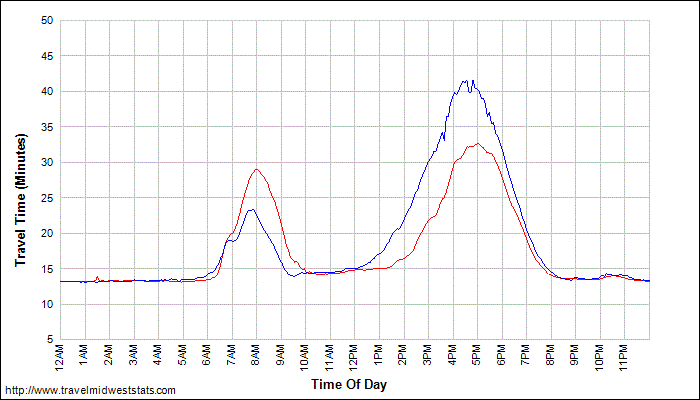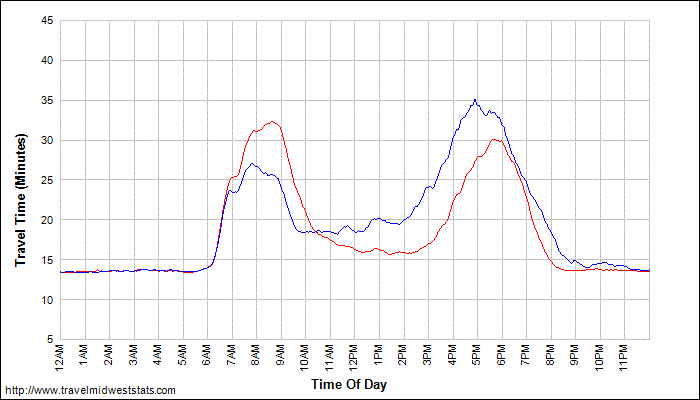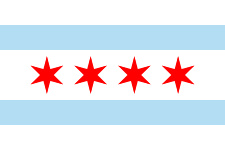I don't want to lose these things:
That is all. More UK and France photos later today.
Happy Spring. The equinox happened less than 11 hours ago, which usually means Chicago has another six weeks of cold and damp weather. Not this time. Trees have buds and flowers, insects have started buzzing around, and as of about an hour ago, we've broken (or tied) our seventh consecutive heat record. This, by the way, is also a record (greatest number of temperature records broken consecutively), breaking the record set...yesterday.
Here are the temperature records we've set so far this month:
| Date |
Old record |
New record |
| March 14 |
25.0°C, 1995 |
27.2°C |
| March 15 |
23.3°C, 1995 |
27.2°C |
| March 16 |
25.6°C, 1945 |
27.8°C |
| March 17 |
23.3°C, 1894, 2009 |
27.8°C |
| March 18 |
23.3°C, 1903, 1918, 1969 |
27.2°C |
| March 19 |
25.6°C, 1921 |
25.6°C (tie) |
| March 20 |
24.3°C, 1921 |
25.0°C as of 10:53am |
Today's forecast high would make it feel more like mid-June than mid-March.
Meanwhile, it's snowing in Arizona...
Update: O'Hare temperature is 28.9°C at 13:51.
I'll have more weekend photos later today (but probably not another post on our record heat wave. Before that, I just found out some great news about Chicago's next major park:
[Chicago mayor Rahm] Emanuel said [at a press conference last week that] initial funding had come together for the $100 million project, which is expected to begin construction later this year and be completed by 2014. Designed by Arup, Ross Barney Architects and Michael Van Valkenburgh Associates, the new park will have benches and foliage on either side of a two-way path.
It looks in renderings much like New York City's High Line, but will be nearly twice as long and with gentle curves and dips. It will also allow bike traffic and include several green space access points at ground level.
Besides offering expansive views across several Chicago neighborhoods, the new park will improve local transport links. The multi-use trail will connect the west side to areas near the lake and the Loop, and the anchor parks will link the trail to L train stations and major bus stops.
The Chicago & Pacific Railroad originally built this 4300 m stretch of rail line at ground level in 1872. After a series of accidents involving pedestrians, the tracks were elevated about a century ago, but have been out of use since the mid-1990s. Within a couple years, the determined and the curious will no longer be forced to slip through fences to use the space and enjoy the view.
I've been looking forward to the project getting off the ground moving forward for years. I haven't taken Parker up there yet, because it's (a) trespassing and (b) covered in broken glass, but possibly in the next week or two I'll go up there with my camera.
For more background, the Chicago Reader had a long article about the trail a couple years ago.
Apparently I've missed some unprecedented weather back home this weekend:
Saturday's high temperature at Chicago's official O'Hare International Airport observing site hit 28°C—the unprecedented fourth consecutive day in the 80s [Fahrenheit]. Sunday's anticipated 29°C high will make it a record 5 straight 80-degree days. Weather records dating back to 1871 should continue to fall as Chicagoans experience a stretch of warm temperatures never before observed in March. Sunday will mark the 6th straight day of 70-degrees or higher, eclipsing the previous record 5-day run on March 12-16, 1995.
The other shoe will drop mid-May or early in June. After the previous 5-day record in 1995, we experienced the hottest summer on record. The lake never froze over this year, and right now it's 6°C warmer than usual, so it won't hold off the summer heat effectively.
I'm afraid. I'm very afraid.
As of 13:51 CDT, the official temperature at O'Hare hit 26°C, passing the previous March 14th record by a degree. Will it get warmer?
The high temperatures at O'Hare the last three days have been
21°C,
18°C, and
21°C, all of them very close to the normal temperatures for mid-May. Right now it's 21°C, and forecasters expect record temperatures today and tomorrow (with a brief interlude tomorrow afternoon as temperatures plummet 11°C for a few hours).
The record high for March 14th is 25°C, set in 1995, during Chicago's longest string of 21°C-plus temperatures in history (5 days, from March 12 to 16). With a forecast (record!) high of 27°C tomorrow (beating the record of 23°C, also set in 1995), it's more like June than March.
Not to beat the drum or anything, but warm springs usually lead to really hot summers. Expect whinging from The Daily Parker in about two months.
Two days each week I have to go out to a client's office about 40 km from home. Only one route works to get me there, and that route includes the infamous Eisenhower Expressway (I-290) leading to the west from the Chicago Loop.
In the last few years, though, the Illinois Dept. of Transportation and neighboring agencies have created Travel Midwest, which has vast stores of traffic data. This has helped me stay sane. The site allows you to query the database to find out, in simple visual charts, when traffic is worst.
This chart compares my morning commute from the Circle Interchange to Wolf Road (22½ km). The red line shows travel times Monday through Thursday; blue line shows Friday times. (The data are from the last 12 months.) This shows why I hit the road around 8:30, instead of earlier, which gets me to the Eisenhower around 9 and here by 9:30:

But here's the return trip; again, Monday-Thursday is red and Friday is blue:

Then there's the chart going the opposite direction right now:

In the chart above, the thick red line shows the mean travel time, and yellow area shows 1 standard deviation on either side of the mean. The lines at 15, 23, and 56 minutes represent 88 km/h (full legal speed), 56 km/h, and 24 km/h. At the moment, the 65-minute travel time means traffic is moving at the breakneck speed of 20.6 km/h, which most bicyclists would find a relaxing speed.
I think I'll stay put for a while. Damn.
Having this information makes it relatively easy not to travel when everyone else is on the road. Yeah, I get home a little later, but the cost to me of spending 30 minutes in slow traffic is higher than the cost of shifting my commutes an hour forward.
We have our first really great spring day—it's 18°C and sunny—and I'm inside. It's also the warmest day we've had since November 13th (21°C).
That is all. Back to the mines.
 The City of Chicago received its first city charter 175 years ago today:
The City of Chicago received its first city charter 175 years ago today:
Chicago's earliest charters reflected its small population, restricted geographic area, and limited governing needs. These first town charters were conferred in 1833 and 1835, when only a few hundred settlers clustered on a small site along Lake Michigan. Under its town charters, Chicago was governed by an elected Board of Trustees which wielded little political or financial power. In 1837 Chicago received its first city charter, which divided the city into six wards, allowed for a mayor elected to a one-year term, and legally incorporated Chicago as a municipality. The city grew so rapidly thereafter that new charter legislation was constantly needed. In 1847 charter legislation increased the wards to nine and designated annual elections for a city attorney, treasurer, tax collector, and surveyor. Still another charter was granted in 1851, followed by more charter legislation in 1853, 1857, and 1861.
On 4 March 1837, Chicago had 4,170 people spilling out of 250 Ha; today, with 2.6 millions in 567 km², we're the 3rd largest city in the U.S. and the 53rd largest in the world. (The metropolitan area, with 9½ million people, is 29th largest in the world.)
On the day Chicago became a city, the spot where I'm sitting was a few meters above a marshy beach, 4 km outside of town. Today it's considered "downtown" in one of the most vibrant and well-balanced cities in the world. And it's my home.
While Chicago finished its ninth-warmest (meteorological) winter in history on February 29th, Illinois as a whole finished its third warmest:
This year the average winter temperature was 1.2°C, 2.9°C above normal, and the third warmest winter on record. Here are the top four warmest winters. As you can see, we had a two-way tie for second place.
- First place, the winter of 1931-32 at 2.8°C;
- Second place, a tie between 1997-98 and 2001-02 at 1.4°C;
- Third place, this winter at 1.2°C.
Not only was it warm in terms of the average temperatures, but this winter lacked the really cold weather. Only a few place had temperatures drop below zero [Fahrenheit, -17.2°C]. The coldest reading for the winter was a mere -21°C at both Galena and Elizabeth in the far northwestern corner of the state.
Chicago had no days below zero Fahrenheit, thanks to the inland sea next to us.
We're now looking forward to a warm and wet spring...